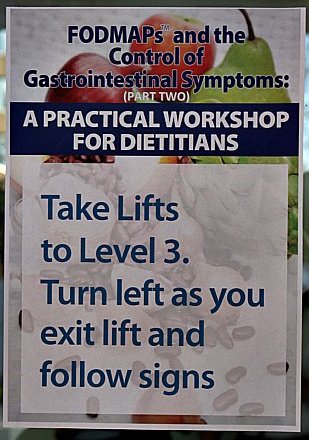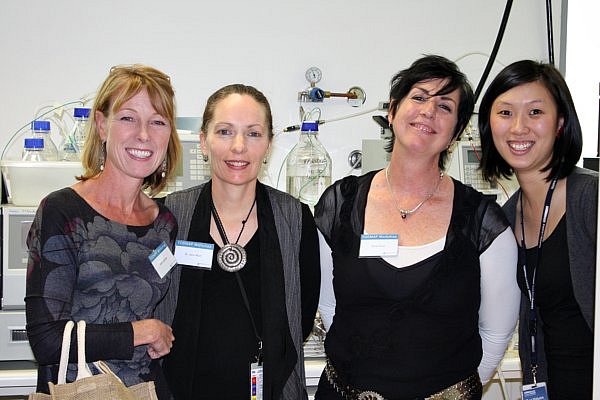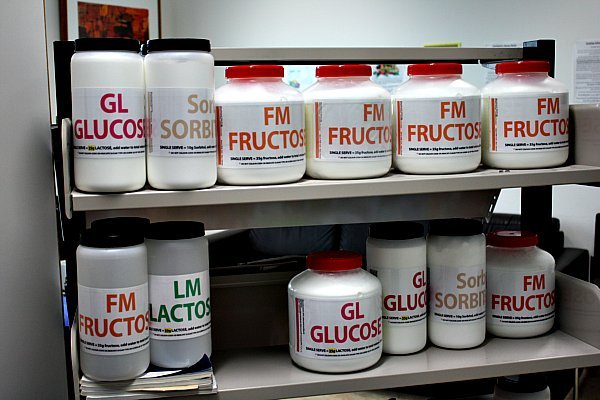I haven’t had a moment to fully share the “science” part of my September 2011 Australia trip! I attended a workshop for dietitians on FODMAPs, a group of poorly absorbed sugars that can contribute to gastrointestinal symptoms. This appealed to the “science-loving” part of my personality and my interest particularly in digestive health.
 For a dietitian that specializes in digestive health, this part of my trip was more than I could have expected. Just meeting the top researchers in the area of FODMAPs was inspirational. I value the research they have done that has made a world of difference for so many of the patients that I work with who have chronic digestive problems.
For a dietitian that specializes in digestive health, this part of my trip was more than I could have expected. Just meeting the top researchers in the area of FODMAPs was inspirational. I value the research they have done that has made a world of difference for so many of the patients that I work with who have chronic digestive problems.
The FODMAPs seminar was a great overview on all the advances in the diet analysis of foods along with new potential uses of the research such as the notion of modifying FODMAP content of enteral formulas to minimize diarrhea in tube fed patients and the potential benefit of a low FODMAP diet in breastfeeding moms with colicky babies. The researchers were very gracious and allowed me to tour the breath lab where they test for fructose malabsorption, lactose intolerance, sorbitol malabsorption and small intestinal bacterial overgrowth. They are very advanced in this area much more than I have experienced here in the US.
All the food at the seminar was low FODMAP and delicious.
While we ate, we had plenty of time to mingle with the attendees and the researchers. I met a couple of dietitians from New Zealand and enjoyed a few moments with Peter Gibson,professor of medicine at Monash University’s Eastern Health Clinical School and one of the leading researchers in FODMAPs.
And introduced myself to Jessica Biesiekierski, a researcher at Monash University and Eastern Health Clinical School who’s paper on grains and FODMAPs I refer to often. Jessica has also done research on gluten intolerance in those without celiac disease, a growing interest in digestive health. 
After the seminar, I headed off to the breath lab where Alicia Moltzen gave a great overview of breath testing. 
Here are the bottles of substrates used in breath testing-even sorbitol-not sure that is done yet in the US!
Then off to the lab where the foods are analyzed for FODMAP content. I took a peek at the kitchen and labs where many studies are ongoing. Very cool! 
Jane Muir, head of research at Eastern Health Clinical School, who is right next to me, coordinated this tour and has been an ongoing resource for me. Thanks Jane!!
Below, Jaci Barrett (on the left) provided numerous case studies and an introduction about use of low chemical diets in patients who do not experience improvement on a low FODMAP diet and Emma Halmos (on the right) discussed use of the low FODMAP diet in patients with inflammatory bowel conditions such as Crohn’s disease noting a study that revealed those with Crohn’s disease are more likely to experience lactose and fructose malabsorption than those with functional gut disorders such as IBS (irritable bowel syndrome)…very interesting!
A great trip which was worth the 22 hours it took to get there! For more on FODMAPs-including my updated check list-take a peek at my “FODMAPs” tab on this blog by clicking here.




sophie kamveris, RD
Wow-that looks like a pretty exciting place with all of the research going on there-and I know you had fun along the way!
Emma Stirling
Great to read about your day at Monash Kate. FODMAP is gaining more and more interest here in Melbourne.
katescarlata
Thanks Emma! It was such a pleasure to meet all the researchers and I continue to consult with them. There is good reason this approach in gaining more and more interest…it works!
lisa williams
I live in Houston Tx and would you believe I called 5 dietitians and none of them ever heard of the FODMAP DIET plan? All of those dietitians were employed by large hospitals. I don’t want to have to educate a dietitian I expect them to help me! Any seminars coming to the Houston area so people can get educated? Sorry if I sound frustrated!
katescarlata
I am frustrated too Lisa! More gastroenterologists and dietitians should know about this diet. This week the key researchers that developed the FODMAP diet are in Washington DC-so hopefully they will enlighten a few of the doctors and the word will spread.
Kate